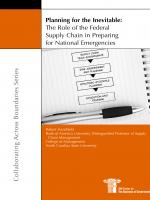
Planning for the Inevitable: The Role of the Federal Supply Chain in Preparing for National Emergencies

 As we have seen in recent years, there has been no shortage of national emergencies—ranging from oil spills to hurricanes to the threat of a pandemic virus. Having an effective supply chain has become critical in effectively responding to these emergencies. In fact, the federal government today clearly recognizes that an effective supply chain can lead to cost savings, and in certain instances, save lives.
As we have seen in recent years, there has been no shortage of national emergencies—ranging from oil spills to hurricanes to the threat of a pandemic virus. Having an effective supply chain has become critical in effectively responding to these emergencies. In fact, the federal government today clearly recognizes that an effective supply chain can lead to cost savings, and in certain instances, save lives.
In addition to serving as an excellent introduction to supply chain management, Professor Robert Handfield’s recent Center report, Planning for the Inevitable: The Role of the Federal Supply Chain in Preparing for National Emergencies increases our understanding of how to assess supply chain preparedness.
Professor Handfield uses the recent H1N1 pandemic threat as an illustrative example of how the federal and state governments need to evaluate their supply chain capabilities in preparation for national emergencies. He also sets forth a framework in which governments can assess their supply chain preparedness prior to an emergency.
A key recommendation of Professor Handfield is the need for a governance structure to initiate the assessment and identification of emergency response plans for each government agency. This governance structure would include both program managers as well as acquisition specialists. Agencies should start today to create dedicated teams to prepare and evaluate agency plans.
We trust that this report will be informative and useful to government managers as they increase their understanding of supply chain management, including the role of supply chain management in preparing to respond to national emergencies.



